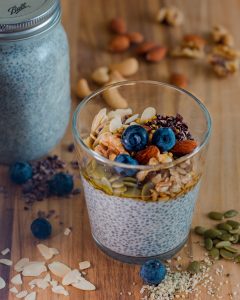 Consuming adequate and balanced amounts of the right fats – omega-3, omega-6 and omega-9 fatty acids – is critical to good health. Essential means the body cannot produce them and has to take them in from outside sources – either through food or supplements.
Consuming adequate and balanced amounts of the right fats – omega-3, omega-6 and omega-9 fatty acids – is critical to good health. Essential means the body cannot produce them and has to take them in from outside sources – either through food or supplements.
What do EFA’s do?
Essential fatty acids play a very important role in the prevention of cancer and heart disease, help reduce and prevent inflammatory conditions such as arthritis, Crohn’s disease, ulcerative colitis, eczema, and psoriasis; they improve the softness and smoothness of your skin and provide many other health benefits. Essential fatty acids are important components of the outer skin or membrane of every cell. The membrane determines which chemicals and nutrients will be allowed to enter and exit the cell; within the cell membrane essential fatty acids are continually activated and converted into prostaglandin hormones, a process that allows essential fatty acids to supply their disease prevention and anti-aging effects to a wide range of tissues within the body. They also:
- Support the production of secretions of digestive enzymes.
- Help make the lubricants that allow joints to move effectively.
- Help transport cholesterol in the blood.
- Help immune function in fighting infection.
- Help balance the immune system and prevent allergies.
- Ensure adequate bone formation and repair.
How much do we need?
We need more omega-3 than omega-6 – in a ratio of about 2:1. A typical Western diet contains only small quantities of omega-3 fatty acids. Modern food processing destroys a lot of the essential fatty acids. The imbalance in the diet of omega-3 to omega-6 places a physiological burden on the body. To get sufficient omega-3 to balance the ratio you would need to eat at least three to four servings of salmon per week. Omega-6 fatty acid is found in abundance in our food supply. It is contained in most plant foods and in virtually all vegetable oils. It is harder to get sufficient alpha- linolenic acid (ALA). The richest food sources of ALA are flaxseed and flaxseed oil, hemp seed oil, pumpkin seeds, soy beans, walnuts and dark green leafy vegetables. If your diet contains sufficient linoleic acid (omega-6) and alpha- linolenic acid (ALA) then your body is usually able to produce the other omega-3 and omega-6 fatty acids that it needs.
What depletes our EFA’s
- Consuming trans-fatty acids (found in brick margarine, shortening, commercially baked goods and processed foods and foods containing partially hydrogenated oils)
- Consuming too much sugar
- Alcohol consumption
- Viral infections
- Diabetes
- Genetic anomalies
- Aging
Why Supplement?
Most individuals suffer unknowingly from an essential fatty acid deficiency or imbalance, thanks to modern agricultural and food processing methods and the typical North American diet. Take a good look at your current consumption of healthy oils in your diet. If you aren’t certain that you are consuming enough of the right types, in the appropriate relative proportions, we urge you to supplement your diet with a high quality supplement. Which supplements? Ask Walter 🙂
